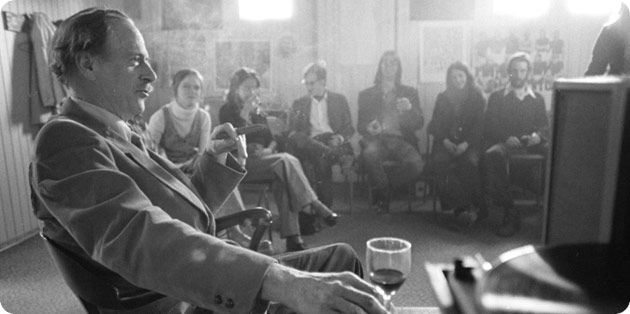Marshal McLuhan never intended to be a pop icon, but this cerebral Canadian philosopher became just that with his cutting edge observations about modern technology and the means of communication. His unique premise, summed up in his most famous sound bite (a term not coined by McLuhan but one which he would have no doubt approved), “the media was the message” stipulated that the very means by which we communicate shapes and forms the very things we are communicating.
More than a generation has passed since McLuhan died but his take on modernity consistently resurrects itself. Look around at the hordes of young people slumped over the screens of their “smart” phones wandering through city streets seeking the next Pokemon character for their electronic collection — makes McLuhan look like a prophet.
McLuhan would be amused by the Pokemon phase. He had quite a good sense of humor as was seen in his cameo in Woody Allen’s film Annie Hall. Woody and Diane Keaton are standing in line for a movie listening to guy pontificate on what Marshall McLuhan meant by this and by that. Finally, Woody Allen’s character can’t take it any longer and breaks the fourth wall talking directly to the movie audience about how irritating it is to have a know it all in a movie line. The man takes umbrage boasting that he himself is a professor and teacher of communication theory and that he knows more about Marshal McLuhan than Woody Allen. Allen’s character then brings the real Marshal McLuhan out from behind a post whereby McLuhan tells the know it all he doesn’t understand a thing about him.
But as famous and influential as Marshall McLuhan was, and is, a lesser known fact about him warrants equal attention. At the tender age of 25, McLuhan entered into the Catholic Church. He credited G.K. Chesterton for his faith - another great convert who inspired countless others. Still having not shed all of my pre-Vatican II triumphalism, I’m always a little too self-satisfied to learn about an intellectual heavyweight and someone with both feet in the secular culture, taking the plunge. It is spiritual adrenalin to think about someone of McLuhan’s stature performing the alchemy of mixing faith with reason and have it culminate in a boat ride across the Tiber.
It’s also easy to acquire an inferiority complex when contemplating converts like him. He considered himself having entered into the Church via the back door through the conveyance of his reason, his will and his belief. I had the faith served up to me on a plate -paper not silver- but handed to me nonetheless.
Marshall McLuhan was a daily communicant, regularly prayed the rosary and was a family man with six children. Pretty strong Catholic hallmarks from a man who had pop culture icons from Andy Warhol and Woody Allen to John and Yoko eating out of his hand. I recently viewed an interview McLuhan did with John Lennon and Yoko Ono in all their post-Beatle splendor. Even for a self-reporting Beatle maniac like me, most of what Lennon said in the interview sounded like gibberish to me. But when you watch McLuhan respond to John and Yoko it is almost mesmerizing. He wasn’t judging, like I just did I think. He truly seemed to want to understand where John Lennon was coming from even if the former Beatle as not at his articulate best. Maybe if I was a daily communicant and more attentive to my faith like Marshall McLuhan was, I would have more patience and a better ear at understanding others.
A biographer summed up McLuhan’s life philosophy which was on evident display in the Lennon interview when suggesting that his philosophy was based on observation and a deep desire to understand what he was observing rather than trying to celebrate or denigrate. He thought this was a path to disclosing God’s plan. And it is when he observes the life of the most important person who ever lived that McLuhan out does himself and his most famous adage comes full circle.
“In Jesus Christ, there is no distance or separation between the medium and the message: it is the one case where we can say that the medium and the message are fully one and the same.”
Robert Brennan has been a professional writer for more than 30 years, including many years in the television industry.

